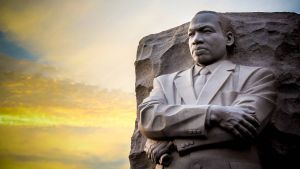Decades after Martin Luther King Jr. led peaceful demonstrators to Edmund Pettus Bridge in Selma, Ala., on March 7, 1965 where they were met with state troopers wielding tear gas and clubs, on Sunday at a commemoration ceremony, members of Congress and Democratic presidential hopefuls brought up the same concerns for the modern day that plagued people of color and poor people throughout the 1900s.
Rigged elections, voter suppression, police brutality, and racism in the White House continue to be issues, just as they were during the civil rights era.
Few police officers ever face trial for shooting deaths, let alone actually get convicted: Lamar Smith, Philando Castile, Terence Crutcher, Alton Sterling – just a few names of Black men shot and killed by police officers that were either acquitted or found not guilty. A 2016 study from Bowling Green University showed that Black men are nearly three times as likely to be killed by police force than white men.
Dozens of Black men and women were killed during the civil rights movement in the 1950s and 1960s alone. Although there is hardly any data on police brutality in the 1800s or 1900s, the 1927-1928 Illinois Crime Survey found that 30 percent of all police killings in Chicago during the time were Black men, even though they only counted for five percent of the population. This survey, though small, underscores the reality that modern day problems are not new.
Several instances of alleged voting suppression were also brought up at Sunday’s event commemorating “Bloody Sunday.” Ohio Senator Sherrod Brown said that the Georgia governor election was stolen from Democrat Stacey Abrams.
“Voting rights are always under attack. We know in Georgia, they stole the election from who should have been governor. They are afraid of what we will do with the vote,” he said.
Voting rights are always under attack. We know in Georgia, they stole the election from who should have been governor. They are afraid of what we will do with the vote. pic.twitter.com/Khk45BI3ev
— Sherrod Brown (@SenSherrodBrown) March 3, 2019
Brown also mentioned the purging of voters and the Supreme Court’s 2013 decision that removed the requirement for the Justice Department to heavily analyze jurisdictions that have a history of racial discrimination in voting.
Since the decision, several states have passed laws and changes to their constitutions enforcing controversial voter ID rules, which critics say keep mostly minorities and poor people from being able to vote and break down the Voting Rights Act of 1965.
“There is plenty of evidence that voter ID will limit access to voting for some of the state’s most marginalized voters, including people of color, rural and low-income voters, the elderly and people with disabilities, all of whom disproportionately lack and face challenges to getting a photo ID,” the ACLU’s Sarah Gillooly said in a statement.
Other modern day examples of voter suppression that hearken back to the civil rights and pre-civil rights eras include disinformation and intimidation at the polls and through advertisements.


















